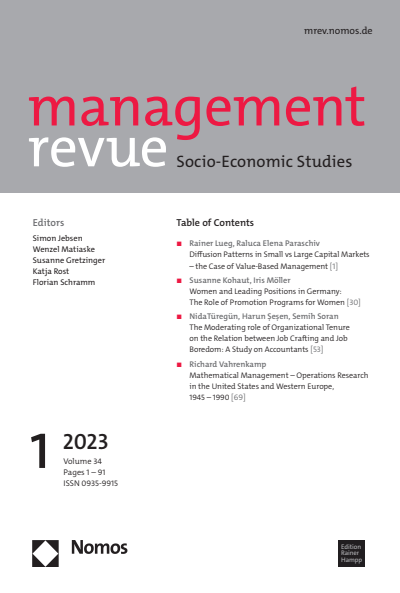员工授权与家长制:授权在交际情境中的嵌入性概念分析
IF 1.7
0 MANAGEMENT
引用次数: 3
摘要
授权作为一种管理技巧,建立在员工渴望更多权力的假设之上。因此,在很大程度上,对员工授权的研究主要集中在界定授权中应该包含的权力类型,识别授权的相关中介和调节作用,以及授权的边界条件,如个人属性和社会属性。然而,很少有研究涉及沟通和关系方面,以及这些方面如何影响员工授权的结果。本文从互动的角度对员工授权的交际意义进行了概念分析。基于交际互动的社会学理论,作者认为,关注领导者和成员对彼此交际信息的意义赋予,揭示了家长式的权力结构,这与授权的成败有关。对常见的结构和心理授权努力的交际分析表明,正式(书面)和非正式(心理)合同所定义的成员对其角色和情境的理解不一定与领导者行为所期望的交际意义一致,反之亦然。本文章由计算机程序翻译,如有差异,请以英文原文为准。
Employee Empowerment and Paternalism: A Conceptual Analysis of Empowerment's Embeddedness in Communicative Contexts
Empowerment as a management technique builds on the assumption that employees desire more power. Consequently, to a large extent, research on employee empowerment has focused on defining the type of power that should be contained in empowerment, identifying relevant mediating and moderating effects of and for empowerment as well as empowerment's boundary conditions such as individual and social attributes. However, less research has dealt with communicative and relational aspects and how these may impact the outcome of employee empowerment. This paper uses an interactional perspective to conceptually analyse communicative meanings entailed in employee empowerment. Building on sociological theories of communicative interaction, it is argued that focusing on leaders’ and members’ ascriptions of meanings to each other’s communicative messages reveals paternalistic power structures that are of relevance for the failure and success of empowerment. A communicative analysis of common structural and psychological empowerment efforts suggests that members’ sensemaking of their roles and situations, as defined by formal (written) and informal (psychological) contracts, may not necessarily be in line with the communicative meanings intended by leaders’ actions, and vice versa.
求助全文
通过发布文献求助,成功后即可免费获取论文全文。
去求助
来源期刊

Management Revue
MANAGEMENT-
CiteScore
1.20
自引率
0.00%
发文量
7
期刊介绍:
Management Revue - Socio-Economic Studies is an interdisciplinary European journal that undergoes peer review. It publishes qualitative and quantitative work, along with purely theoretical papers, contributing to the study of management, organization, and industrial relations. The journal welcomes contributions from various disciplines, including business and public administration, organizational behavior, economics, sociology, and psychology. Regular features include reviews of books relevant to management and organization studies.
Special issues provide a unique perspective on specific research fields. Organized by selected guest editors, each special issue includes at least two overview articles from leaders in the field, along with at least three new empirical papers and up to ten book reviews related to the topic.
The journal aims to offer in-depth insights into selected research topics, presenting potentially controversial perspectives, new theoretical insights, valuable empirical analysis, and brief reviews of key publications. Its objective is to establish Management Revue - Socio-Economic Studies as a top-quality symposium journal for the international academic community.
 求助内容:
求助内容: 应助结果提醒方式:
应助结果提醒方式:


